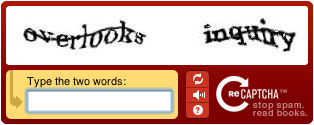When purchasing online, signing up for forums, or logging into an account, chances are you’ll face the irritation of guessing the curvy words inside a captcha box.
Known as a Completely Automated Public Turing test to tell Computers and Humans Apart, a captcha box is the standard defensive against spam bots that scour the internet. Although captcha boxes offer a great defense, the words used can be nearly impossible to read for a human.
As shown below, captcha attempts to take words from books, pictures, and other sources and attempts to distort the image, making the text unreadable to spam bots. While the image below clearly reads “overlooks inquiry” we’ve all faced the irritation when the words are not quite as simple.

It was just the other day that I attempted to log into an account, but was constantly stopped when asked to enter an unreadable four character code. Not only was I declined access to my account, but it left a negative taste towards the website.
While websites still require the complexity of captcha, new studies are beginning to show how new generation spam bots are now smart enough to understand the wavy, bolded, and distorted text boxes; up to 99.8% accuracy. The answer to these new spam bots? Perhaps make the words next to impossible to read!
Rather than include more complications into this already irritating mix, the researchers at Google have taken a whole new approach in the war against spam. The solution was easy, stop the spam bots, but offer a quick and easy user experience.
Labeled as the “no CAPTCHA reCAPTCHA” Google has chosen to eliminate the distorted text and replace it with a single check box labeled “I’m not a robot”. Is it really that simple?
It works by studying your browser habits to see how you interact with the webpage. After a brief scan, the new mechanism grants you access to the websites forum as a human. Google’s claim is that bots cannot bypass its new API and the Google captcha offers a more advanced protection in today’s internet. If the new captcha cannot prove you’re a human, you will be asked to either type an easy to read three digit number or by selecting from three choices, an image to match the one provided.
In the end, I am excited for the new wave of Google’s captcha and already having experience with it, my transactions on the internet are even faster. In my opinion, Google’s “risk analysis” that they mention in the video above, analyses your browser’s cookies to detect whether or not you have a Google Account. By verifying your Google Account, Google can then verify your human presence and certainly not a bot. With more websites already adopting the Google service, we can begin to say goodbye to the old reCaptcha.
© 2014 techsupportforum.com

